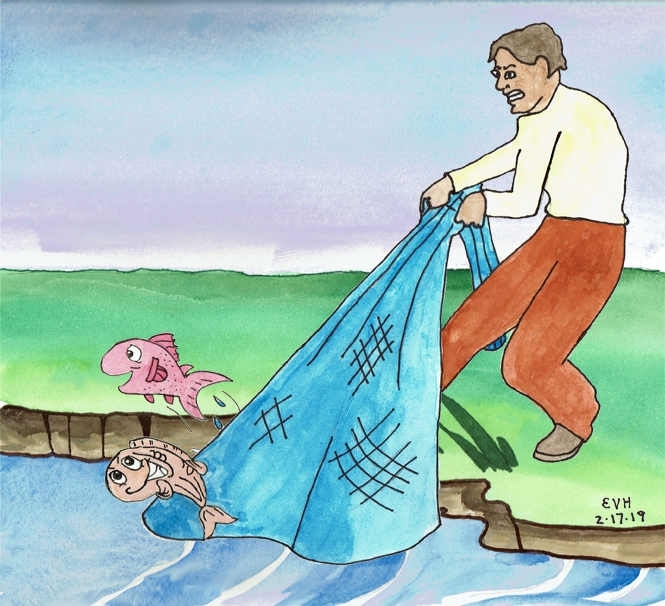
Jataka 114
Mitacinti Jātaka
The Fish Story
as told by Eric Van Horn
originally translated by Robert Chalmers, B.A., of Oriel College, Oxford University
originally edited by Professor Edward Byles Cowell, Cambridge University
Ah, laziness! When people first come to the Dharma they often have an idealized view of Buddhism. But this is real life. Through the ages many people – mostly monks – ordain because they think it is an easy life. You don’t get much, but it is all free, and if you are very poor, the life of a monk can seem appealing. The Dharma is rewarding, of course, but it also requires effort.
It may also be comforting to know that fish stories are – apparently - universal.
“Caught in the fisherman’s net.” This story was told by the Master while at Jetavana. It is about two elder monks. After spending the rainy season in a forest in the country (the rains retreat, or “vassa”), they decided to go see the Master. They gathered provisions for their journey, but they kept putting off their departure day by day until an entire month went by. Then they gathered another supply of fresh provisions, but once again they procrastinated until a second month went by, and then a third. When their indolence and sluggishness had cost them three months, they finally set out and went to Jetavana. Laying aside their bowls and robes in the common room, they went into the Master’s presence. The monks commented on how long it had been since the two had visited the Master, and they asked them why this was. Then they told their story, and the entire Saṇgha came to know of the laziness of these indolent monks.
Assembling in the Dharma Hall the monks discussed this matter. The Master entered and was told what they were discussing. Being asked whether they were really so lazy, those monks admitted their short-coming. “Monks,” he said, “in former times, just as now, they were lazy and reluctant to leave their residence.” So saying, he told this story of the past.
Once upon a time when Brahmadatta was reigning in Benares, there were three fish who lived in the river of Benares. They were named Over-thoughtful, Thoughtful, and Thoughtless. They swam downstream from the wild country to where men lived. Thoughtful said to the other two, “This is a dangerous and perilous place. Fishermen catch fish with nets, basket-traps, and other such equipment. Let us go back to the wild country again.”
But the other two fish were so lazy and so greedy that they kept procrastinating until three months had slipped by.
One day some fishermen cast their nets into the river. Over-thoughtful and Thoughtless were swimming in search of food when they blindly rushed into the net. Thoughtful, who was behind them, saw the net and what had happened to them.
“I must save these lazy fools from death,” he thought. He swam around the net and splashed in the water in front of it like a fish that had broken through and gone up stream. He then doubled back and splashed behind it like a fish that had broken through and gone down stream. Seeing this, the fishermen thought the fish had broken the net and gotten away, so they pulled it up by only one corner. This allowed the two fish to escape from the net into the open water again. In this way they owed their lives to Thoughtful.

Figure: The Foolish Fish are Freed
His story told, the Master, as Buddha, recited this stanza:
The two fish were caught in the nets.
Then Thoughtful saved them and they were free again.
His lesson ended, he taught the Four Noble Truths. At the close of his discourse the aged monks attained stream-entry. Then the Master identified the birth by saying, “These two monks were Over-thoughtful and Thoughtless, and I was Thoughtful.”
